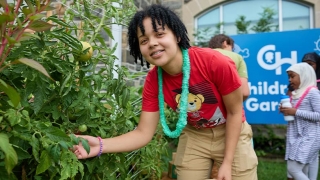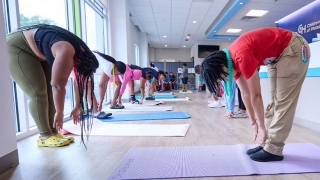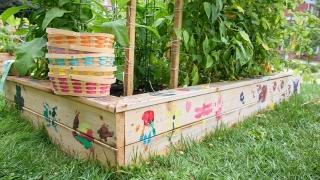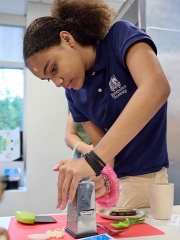Planting the Seeds of a Healthy Diet
Published on
Children's ViewPublished on
Children's View Steven’s enthusiasm bubbled over. He picked a green pepper from a raised garden bed and, beaming, dropped it into a sack his mother held, alongside a couple of tomatoes and some basil. Then he dashed back for more.
Steven’s enthusiasm bubbled over. He picked a green pepper from a raised garden bed and, beaming, dropped it into a sack his mother held, alongside a couple of tomatoes and some basil. Then he dashed back for more.
A 6-year-old excited about peppers and basil?
It’s the product and the promise of Food as Medicine, an innovative program at the Nicholas and Athena Karabots Primary Care Center, Norristown.
“Steven loves coming here,” his mother, Lyndsey Hoffman, says. “He loves to pick the foods and flowers. He loves the cooking program.”
While he’s having all that fun, Steven is also absorbing lessons in gardening, cooking and healthy eating.
 Food as Medicine began at Children’s Hospital of Philadelphia as a pilot program in 2022 in response to families facing food instability coming out of the pandemic. Victoria Armstrong, MSW, then Norristown’s social worker and now CHOP’s Community Health Programs Coordinator for Primary Care, conceived a plan that would bring food directly to families’ homes and also provide nutrition education.
Food as Medicine began at Children’s Hospital of Philadelphia as a pilot program in 2022 in response to families facing food instability coming out of the pandemic. Victoria Armstrong, MSW, then Norristown’s social worker and now CHOP’s Community Health Programs Coordinator for Primary Care, conceived a plan that would bring food directly to families’ homes and also provide nutrition education.
“We wanted a holistic approach that encompasses the mind and body,” Armstrong says. “Activities focus on the kids, but the parents learn along with them.”
Armstrong recruited community partners to flesh out her vision for 2023. With the support of an anonymous donor and partner organizations, the multifaceted program has been a rousing success for the 27 families enrolled.
The boxes of fresh produce, grown by the Pennsylvania Horticultural Society (PHS) on a nearby farm and delivered to families’ homes weekly from May to November, contain a card identifying what’s inside and recipes that feature that week’s offerings. Martha’s Choice Marketplace, a Catholic Social Services food pantry in Norristown, provides a bag of nonperishable goods twice a month to supplement the produce.
Each family receives a meal preparation kit, which includes basic kitchen utensils, salad spinners, cutting boards and other items, plus a cookbook full of easy-to-make, kid-friendly recipes.
 Families come to the primary care center one evening a month for a smorgasbord of food- and health-related educational programming.
Families come to the primary care center one evening a month for a smorgasbord of food- and health-related educational programming.
Activities begin with story time; each book has a food-related theme and is applicable for a wide range of ages. A volunteer from Reach Out and Read, a national literacy program CHOP participates in, reads and each family gets to take a copy of the book home.
Then comes a fitness segment, led by the dynamic duo of Jordan and Emily Deane of Cutloose Studio, who create kid-friendly exercises centered around a monthly theme. Each child has their own yoga mat, which they’ll keep at the end of the season.
The children move outside to a side yard where raised beds, planted by the kids — with help from PHS — await them. Throughout the growing season, the children have learned about gardening, plant growth and harvesting from two PHS staffers.
After that, it’s back inside to the center’s kitchen, where the PHS staff lead a cooking demonstration of a recipe based on the week’s available produce. Each child has a cooking station, where they practice skills like chopping and grating as they prepare the day’s healthy snack. Taste testing is next.
The evening ends with a free meal for the whole family, cooked by Norristown-area restaurants.
 “I like the Food as Medicine program because it teaches the kids healthier ways to eat,” says Silver Green, who participates with her 10-year-old daughter, Ivory. “When they actually plant and harvest the vegetables and cook them, it makes the kids want to try them. They learn how to safely use utensils in the kitchen. I like how they incorporate exercise into the program.”
“I like the Food as Medicine program because it teaches the kids healthier ways to eat,” says Silver Green, who participates with her 10-year-old daughter, Ivory. “When they actually plant and harvest the vegetables and cook them, it makes the kids want to try them. They learn how to safely use utensils in the kitchen. I like how they incorporate exercise into the program.”
Ivory isn’t a big vegetable eater, so Green has taken to juicing some of the vegetables the family receives in its weekly box.
“They deliver fresh vegetables to our house every Friday, and we pretty much use them for everything. Eating healthy sometimes can be expensive, so that definitely helps out,” Green says. “Since Ivory is a picky eater, we've used the vegetables to juice as a way to get vegetables in her.”
Karabots in Norristown is also the newest location for another CHOP food-related program: the Food Pharmacy. Families that indicate they don’t always have enough nourishing food at home to support a healthy lifestyle receive free food and help applying for government and community food programs.
In August, The GIANT Company donated $1 million to bring a Food Pharmacy to Norristown, where 17% of the population lives below the poverty line. The GIANT Company has been supporting CHOP’s fight against food insecurity since 2018. Their initial gift launched the Food Pharmacy, and another gift in 2020 fueled its first expansion.
In the Norristown iteration, families can order food online, with the help of a resource navigator, and items will be delivered to their homes. There will be a small in-person pantry at Karabots that will store dry food and serve as another resource for families.
 What makes the Food as Medicine program unique is its fun approach that involves the kids.
What makes the Food as Medicine program unique is its fun approach that involves the kids.
“I think the program is great for the kids because it teaches them to be healthy and to learn about different foods — what’s good for them and what’s not,” Hoffman says.
Nutrition’s role in healthy development can’t be overstated. “Looking at overall wellness, food feeds the mind and feeds the body,” Armstrong says. “We can’t live without it. Having these programs is not optional where there is a need. There was a need in Norristown, and we found a way.”
In her new position, it is Armstrong’s job to bring health-related programming to communities across the CHOP Care Network. “In the future,” she says, “I would love to be able to have a Food as Medicine program at every CHOP primary care office where there is a need.”
To support Food as Medicine, contact Chris Major at majorc@chop.edu.